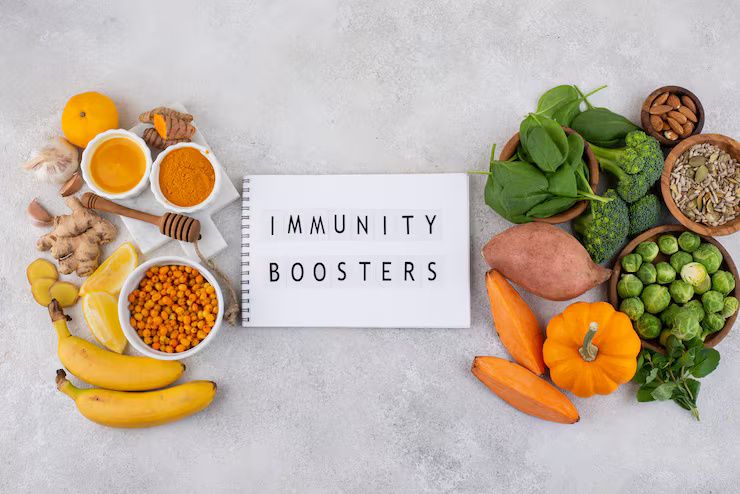A Complete Guide to Immunity-Boosting Foods for Every Season
Our immune system is the body’s natural defense mechanism against infections, diseases, and environmental stressors. While genetics and lifestyle play a role in immunity, your daily diet has a powerful impact on how well your immune system functions.
With changing seasons—whether it’s the flu-prone winter, allergy-heavy spring, or heat-exhausting summer—our immune needs shift. Eating a variety of immune-supportive foods can keep your body strong all year long.
This article explores seasonal and evergreen foods that enhance immunity, backed by nutritional science and ancient wellness practices.
The importance of supporting immunity in today's world
With growing concerns about seasonal illnesses, environmental pollution, pandemics, and stress-related health issues, building a resilient immune system is more important than ever.
A strong immune system helps:
-
Prevent frequent colds, flu, and infections
-
Improve wound healing and recovery
-
Regulate inflammation and allergies
-
Maintain energy levels and mental clarity
-
Reduce long-term health risks
This topic is especially relevant to:
-
Individuals with demanding jobs or travel schedules
-
Seniors and children with developing or weakened immunity
-
Anyone looking to adopt a natural approach to health maintenance

Recent trends and updates in immunity and nutrition (2024–2025)
-
Plant-based diets are gaining popularity for their anti-inflammatory and immune-enhancing benefits.
-
Functional foods like turmeric lattes, mushroom coffee, and fermented drinks have become wellness staples.
-
WHO and health experts emphasize diversity in diet to support gut health, which is closely linked to immunity.
-
There's rising interest in seasonal eating—choosing foods based on local harvest cycles—to align with natural body rhythms.
-
Immunity gummies and fortified snacks have become common, but whole food sources remain the gold standard for sustained health benefits.
Top foods that boost immunity all year round
These immunity-enhancing foods are beneficial across all seasons and should be part of a balanced diet:
1. Citrus Fruits
Rich in vitamin C, which increases white blood cell production and enhances the immune response.
Examples:
-
Oranges
-
Lemons
-
Grapefruits
-
Limes
2. Garlic
Contains allicin, a compound known for its antimicrobial and immune-strengthening properties.
3. Ginger
Fights inflammation and supports digestion—both crucial for immune health.
4. Turmeric
Its active compound curcumin is a powerful anti-inflammatory and antioxidant.
5. Yogurt and Probiotics
Support gut health, where about 70% of immune cells reside. Choose varieties with live and active cultures.
6. Leafy Greens
Spinach, kale, and arugula provide vitamins A, C, E, and antioxidants to protect against cellular damage.
7. Almonds and Seeds
Excellent sources of vitamin E, healthy fats, and zinc—key nutrients for immune regulation.
8. Berries
Blueberries, strawberries, and blackberries are rich in polyphenols and vitamin C to protect cells from oxidative stress.
9. Green Tea
Contains epigallocatechin gallate (EGCG), a compound known to enhance immune function.
10. Honey
A natural antibacterial and antiviral agent, especially effective in soothing sore throats.
Seasonal immunity boosters to include throughout the year
| Season | Best Foods |
|---|---|
| Winter | Sweet potatoes, carrots, citrus fruits, soups with garlic and turmeric |
| Spring | Spinach, strawberries, peas, probiotic-rich foods (kefir, yogurt) |
| Summer | Watermelon, cucumbers, berries, fresh herbs like mint and basil |
| Monsoon | Ginger tea, tulsi leaves, fermented foods, well-cooked vegetables |
| Autumn | Apples, nuts, mushrooms, warm spiced teas with cinnamon and clove |
Laws, policies, and food safety standards in India and beyond
Many countries, including India, follow FSSAI (Food Safety and Standards Authority of India) and global agencies like WHO and FDA, which regulate food labeling, nutrition claims, and food safety.
Key regulations include:
-
Fortification of staples like milk, salt, and oil with vitamins D, A, and iron
-
Guidelines for daily nutrient intake for children and adults
-
Restrictions on false immunity-boosting claims in advertising
-
Encouragement of "Clean Label" practices, reducing synthetic additives
Consumers are advised to rely on whole, unprocessed foods for long-term immune benefits rather than quick-fix supplements.
Tools and resources to track immunity-boosting nutrition
Here are some helpful tools and platforms:
| Tool/App | Use |
|---|---|
| MyFitnessPal | Tracks nutrient intake and sets daily immunity goals |
| Yazio | Offers seasonal meal planning with immune-rich recipes |
| FSSAI Eat Right | Provides official dietary guidelines and food safety tips |
| HealthifyMe | Indian app offering nutritionist support and food tracking |
| WHO Nutrition | Access to immunity-building food guidelines worldwide |
Frequently Asked Questions (FAQs)
1. Can I build strong immunity only through food?
While food plays a critical role, immunity also depends on sleep, stress management, physical activity, and hydration. Nutrition is the foundation but works best when combined with a healthy lifestyle.
2. Are immunity-boosting supplements necessary?
Not for everyone. Most nutrients can be obtained from a balanced diet. Supplements may be helpful in cases of deficiency, but they should be used with professional guidance.
3. How does gut health relate to immunity?
A healthy gut supports immune function by maintaining good bacteria balance. Eating fiber-rich, fermented, and probiotic foods can support this system.
4. Can children follow the same immunity-boosting diet?
Yes, with portion adjustments. Encourage fruits, veggies, and whole foods, while limiting sugar and processed snacks.
5. What foods should I avoid to protect my immune system?
Limit intake of:
-
Excessive sugar
-
Deep-fried foods
-
Ultra-processed snacks
-
Alcohol in large quantities
These can suppress immune response and increase inflammation.
Final Thoughts
Strengthening your immune system is not about taking a magic pill—it’s about consistency in healthy eating and lifestyle choices. Incorporating a mix of colorful fruits, vegetables, herbs, seeds, and fermented foods into your meals can make a noticeable difference in your energy, resistance to illness, and overall wellness.
Remember: Nature provides all the tools we need for strong immunity—season after season.
